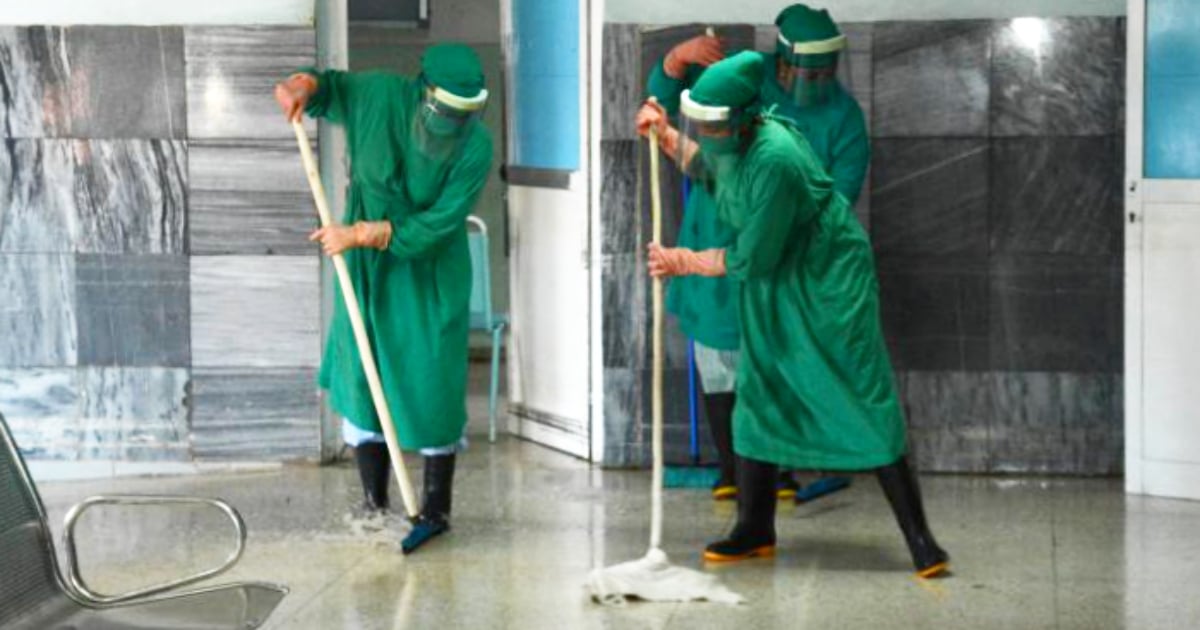A Cuban private cleaning company has sparked significant attention online by advertising job positions with salaries that far exceed what doctors earn in Cuba. The announcement from the small and medium-sized enterprise ECONOVA SURL, shared on platforms like Revolico and social media, outlines job opportunities for cleaning roles in Havana hospitals, offering up to 20,000 Cuban pesos (CUP) in wages.
Highlighted positions include a Chief of Services role with a salary of 20,000 CUP, an Emergent Supervisor position at 13,000 CUP, and a Cleaning Assistant job earning 11,250 CUP. ECONOVA SURL also promises complete gear for employees such as gloves, work boots, uniforms, and necessary supplies for their duties.
These salary figures starkly contrast with the earnings of Cuban doctors, who, despite extensive education and professional dedication, receive significantly lower wages amid a high cost of living. Officially, a newly graduated doctor earns 4,610 CUP monthly, which slightly increases to 5,060 CUP with residency and 5,560 CUP after specialization.
Despite salary reforms in 2021 and recent adjustments in 2024, compensation remains inadequate against inflation. While additional payments for night shifts, exposure, and seniority have been introduced, experienced doctors, including those in academic and scientific roles, barely reach 7,500 CUP per month. This income fails to meet basic needs in the ongoing economic crisis.
The Salary Disparity and Economic Priorities
ECONOVA SURL's job offer has ignited a debate over the wage imbalance between technical professions and essential workers like doctors, who endure low pay and challenging work conditions with limited resources. This situation questions Cuba's salary priorities and highlights the growing allure of private enterprises as viable employment alternatives.
The Challenges of Cuban Medical Professionals
The plight of Cuban doctors has increasingly come under scrutiny due to their low wages and difficult working conditions, despite their vital role in the nation's public health system. Once a respected and socially esteemed career, the medical profession has been marred by economic constraints and widespread dissatisfaction among physicians, many of whom rely on gifts and "donations" from grateful patients.
Recent testimonials reveal that even doctors with over a decade of experience struggle to meet basic needs. Take the example of Dr. María Martínez, who, after more than 11 years in healthcare, still cannot afford her own home and lives modestly with her family. This story is a common one among many in the field, who often rely on family resources to get by.
Despite being relatively better paid than other professions in Cuba, doctors' salaries are insufficient in the face of inflation and shortages of essential goods. In 2024, an experienced doctor with multiple specializations earns an average of 7,500 CUP per month, roughly equivalent to 20 USD on the informal currency market. This amount barely covers the cost of basic necessities.
Government Efforts and International Missions
The Cuban regime has attempted to implement salary increases in key sectors like healthcare and education. In 2024, a budget boost was announced, allocating over 13,000 million pesos to public health. However, these increases are seen as insufficient to stem the mass exodus of doctors abroad or toward more lucrative economic activities within the island.
Additionally, international medical missions, touted by the government as a triumph of global solidarity, are a major revenue source for the Cuban state. In 2018, these programs generated over 6.4 billion dollars, double the income from tourism during the same period. However, participating doctors report poor working conditions, low pay, and restricted freedoms, leading international bodies to criticize these practices as a form of forced labor.
In conclusion, the declining salaries of Cuban doctors and the policies surrounding the export of medical services highlight systemic contradictions. While the government seeks to improve salaries and promote export programs as solutions, Cuban doctors continue to face serious challenges in achieving a dignified living within their country.
The Dire State of Hospital Hygiene in Cuba
The hygiene conditions in Cuban hospitals illustrate the severe crisis impacting the island's public health system. Recent reports expose the unsanitary environments confronting patients, families, and medical staff in deteriorating facilities lacking basic resources to maintain minimal cleanliness and sanitation standards.
An alarming example is the South Children's Hospital in Santiago de Cuba, where bathrooms are in extreme disrepair, with broken fixtures and no maintenance, forcing patients, including children, and their caregivers to cope without water or cleaning supplies. Mothers warn that these conditions could worsen illnesses or lead to additional infections.
Similar situations are found in other facilities, such as the Martyrs of April 9 Hospital in Sagua la Grande, Villa Clara, where images show clogged bathrooms surrounded by trash, rendering them entirely unusable. At the Salvador Allende Clinical Surgical Hospital in Havana, patients face not only inadequate infrastructure but also a lack of clean sheets and basic personal hygiene resources.
These deficiencies not only compromise the quality of medical care but also increase the risk of hospital-acquired infections, creating a sense of helplessness for both patients and healthcare workers. Despite frequent complaints, official responses are often inadequate, occasionally blaming patients for the deplorable conditions.
The shortage of basic supplies, cleaning personnel, and proper resource management underscores the seriousness of the issue. The hygiene conditions in Cuban hospitals have become a major concern for the population, demanding urgent solutions to ensure a minimum of dignity and health security.
